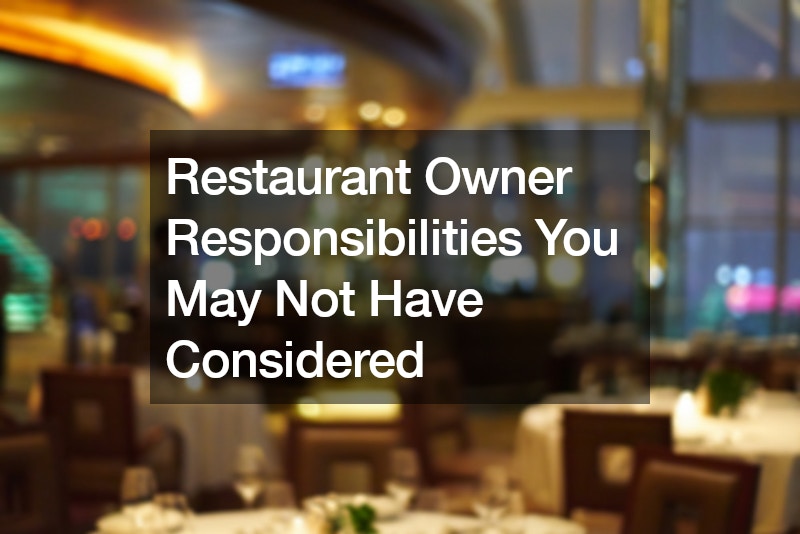
As a restaurant owner, there are numerous responsibilities that come with running a successful establishment. While many may be obvious, there are several key responsibilities that you may not have considered. In this article, we will explore these often overlooked responsibilities and why they are crucial for the overall success of your restaurant business.
1. Are restaurant owners responsible for food safety?
Ensuring proper food handling practices is essential for restaurant owners to prevent foodborne illnesses and maintain a positive reputation. Regularly inspecting kitchen equipment, such as ovens and refrigerators, can help identify any potential hazards or issues that may compromise food safety. Training staff on food safety protocols is also crucial to ensure consistency and compliance with health regulations.
Complying with food safety regulations is a legal responsibility that restaurant owners must adhere to in order to operate their establishment. Obtaining permits and licenses from local health departments is essential to demonstrate compliance with food safety standards. Handling labor and employment laws is another legal responsibility that restaurant owners must navigate to avoid potential lawsuits or fines.
Employment attorneys can provide valuable guidance on navigating labor laws and regulations to protect the rights of both restaurant owners and employees. Implementing job training programs for business owners can also help improve overall operations and ensure compliance with employment laws.

2. What are the legal responsibilities of restaurant owners?
Complying with health and safety regulations is a legal responsibility that restaurant owners must uphold to ensure the well-being of their customers and employees. This includes maintaining a clean and safe dining environment, regular health inspections, and proper waste management practices. Hiring a professional plumbing service for regular maintenance and repairs can help prevent plumbing issues that may compromise health and safety standards.
Commercial metal fabrication companies can provide custom solutions for kitchen equipment and fixtures that meet health and safety standards. Partnering with HVAC companies for regular maintenance and inspections of ventilation systems is crucial to ensure proper air quality and temperature control in the restaurant.
Implementing emergency response plans is another legal responsibility that restaurant owners must address to ensure the safety of customers and employees in times of crisis. Training staff on emergency procedures and regularly conducting drills can help mitigate risks and ensure a timely and effective response to emergencies.
Be sure to follow local and regional regulations for how your building should be run as well as the business itself. For example, certain areas require interior spaces to be kept at a comfortable temperature. It would be helpful if you had an HVAC company on standby to quickly handle issues with your unit.
3. How do restaurant owners manage employee responsibilities?
Creating employee handbooks that outline expectations, policies, and procedures can help establish clear guidelines for staff to follow. Providing training and development opportunities for employees can improve performance, morale, and retention. Establishing clear communication channels between management and staff can also help address any issues or concerns that may arise.
Promoting diversity and inclusion in the workplace is essential for creating a more inclusive and welcoming environment for employees. Preventing harassment and discrimination through training and policies can help maintain a positive and respectful workplace culture. Offering mental health support and promoting work-life balance can also improve employee satisfaction and well-being.
Participating in community programs and initiatives can help restaurant owners build relationships with local residents and organizations. Sponsoring events and local charities can help support the community and enhance the restaurant’s reputation. Collaborating with local businesses and influencers can also help increase visibility and attract new customers to the restaurant.
4. What are the responsibilities of restaurant owners towards customers?
Ensuring high-quality service is essential for satisfying customers and building loyalty. Handling customer complaints and feedback in a timely and professional manner demonstrates a commitment to customer satisfaction. Maintaining clean and safe dining areas is crucial to creating a positive dining experience for customers.
Implementing sustainability practices, such as reducing food waste and implementing recycling programs, can help minimize the restaurant’s environmental impact. Sourcing local and organic ingredients can support local farmers and enhance the quality and freshness of menu items. Implementing energy-efficient practices, such as using LED lighting and programmable thermostats, can help reduce energy consumption and lower utility costs.
Developing marketing strategies that highlight the restaurant’s unique offerings and value proposition can help attract new customers and retain existing ones. Utilizing social media and online platforms to engage with customers and promote specials can enhance the restaurant’s visibility and reach. Collaborating with local businesses and influencers can help broaden the restaurant’s audience and attract new patrons.

5. How can restaurant owners promote sustainability and eco-friendly practices?
Sourcing local and organic ingredients is not only beneficial for the environment but also enhances the quality and flavor of menu items. This can differentiate the restaurant from competitors and attract environmentally-conscious customers. Reducing food waste through portion control, composting, and donation programs can minimize environmental impact and support the community.
Implementing energy-efficient practices, such as installing energy-saving appliances and LED lighting, can reduce energy consumption and lower utility costs. Partnering with sustainability consultants can provide guidance on implementing eco-friendly practices and reducing the restaurant’s carbon footprint. Investing in alternate fuel vehicles for CO2 delivery can support sustainability efforts and reduce greenhouse gas emissions.
Collaborating with local landscape designs companies for green infrastructure projects, such as rain gardens and bioswales, can help manage stormwater runoff and improve water quality. Utilizing waterproofing companies for foundation and basement waterproofing can prevent water damage and enhance building sustainability. Implementing green roofs and green walls can also improve energy efficiency and reduce the restaurant’s environmental impact. It’s equally important for an owner to consider how waste will be handled on a day-to-day basis. Will you partake in recycling efforts? How will you dispose of chemical waste and oils? Will a garbage company pick up your waste or will it be taken to a local dump? These are all important things to talk about before opening a restaurant.
6. What are the financial responsibilities of restaurant owners?
Managing budgets and finances is a critical responsibility for restaurant owners to ensure profitability and sustainability. Tracking inventory and implementing cost control measures can help minimize waste and maximize profits. Filing taxes and payroll accurately and on time is essential to avoid penalties and maintain compliance with tax laws.
Partnering with financial advisors and accountants can provide valuable insights and guidance on managing finances and maximizing profitability. Implementing POS systems and automation software can streamline processes and improve efficiency in managing finances. Conducting regular financial audits and analysis can help identify areas for improvement and optimize financial performance.
Developing business plans and financial projections can help restaurant owners set financial goals and track progress towards achieving them. Seeking financing options, such as loans or grants, can provide capital for growth and expansion. Implementing cost-saving measures, such as energy-efficient appliances and waste reduction programs, can help improve financial performance and sustainability.

7. How do restaurant owners handle marketing and promotion?
Developing marketing strategies that target the restaurant’s key demographics and highlight its unique offerings can attract new customers. Utilizing social media platforms, such as Facebook and Instagram, to promote specials and engage with customers can increase visibility and brand awareness. Collaborating with local businesses and influencers can help broaden the restaurant’s audience and reach new customers.
Creating a strong brand identity and consistent messaging across marketing materials and channels can help differentiate the restaurant from competitors. Offering loyalty programs and discounts to repeat customers can encourage customer retention and increase customer lifetime value. Implementing online ordering and delivery services can expand the restaurant’s reach and cater to customers who prefer convenience and flexibility.
Investing in professional photography and videography for marketing materials and social media posts can showcase menu items and create engaging content. Partnering with food bloggers and influencers for reviews and promotions can increase visibility and attract new customers. Offering catering services for events and parties can generate additional revenue and showcase the restaurant’s culinary expertise.
8. What are the responsibilities of restaurant owners in terms of community engagement?
Sponsoring events and local charities can help support the community and enhance the restaurant’s reputation. Participating in community programs and initiatives, such as fundraisers and volunteer opportunities, can strengthen ties with local residents and organizations. Building relationships with local businesses and influencers can help increase visibility and attract new customers to the restaurant.
Collaborating with local landscape designs companies for community beautification projects, such as parks and gardens, can demonstrate the restaurant’s commitment to enhancing the local environment. Partnering with non-profit organizations for fundraising events and initiatives can help support important causes and foster goodwill in the community. Hosting community events, such as cooking classes and tastings, can engage residents and promote a sense of community.
Creating partnerships with schools and educational institutions for job training programs can provide opportunities for students and support the development of future talent. Offering internships and apprenticeships to students can help them gain valuable experience and skills in the restaurant industry. Providing scholarships and educational grants can support students pursuing careers in culinary arts and hospitality.
9. How do restaurant owners ensure a safe and inclusive work environment?
Implementing diversity and inclusion policies can help create a more inclusive and welcoming workplace for employees of all backgrounds. Preventing harassment and discrimination through training and policies can foster a respectful and supportive work environment. Promoting work-life balance and providing mental health support can improve employee well-being and performance.
Partnering with employment attorneys to develop policies and procedures that comply with labor laws and regulations can protect the rights of both restaurant owners and employees. Conducting regular employee evaluations and feedback sessions can help identify areas for improvement and provide opportunities for professional growth. Providing training and development opportunities for employees can improve job satisfaction and retention.
Offering competitive wages and benefits, such as healthcare and retirement plans, can attract and retain top talent in the restaurant industry. Providing opportunities for career advancement and skill development can help employees grow and progress within the organization. Implementing recognition programs and incentives for outstanding performance can motivate employees and promote a positive work culture. In the event that you have disgruntled employees, it’s important to have reliable legal representation. An employment attorney can help during this situation, but it’s crucial to get ahead of this issue by creating a comforting and motivating atmosphere for everyone who enters your establishment, customer or employee.

10. What are the responsibilities of restaurant owners in times of crisis or emergencies?
Developing emergency response plans that outline procedures for various crisis situations, such as fires and natural disasters, is essential to ensure the safety of customers and employees. Training staff on emergency procedures and conducting regular drills can help prepare them to respond effectively in emergencies. Communicating with customers and the community in crisis situations can provide reassurance and guidance.
Partnering with security firms for surveillance and security measures can help prevent and mitigate risks in the restaurant. Establishing relationships with local law enforcement and emergency services can facilitate a coordinated response in emergency situations. Investing in technology, such as emergency notification systems and alarms, can help raise awareness and prompt swift action in emergencies.
Collaborating with insurance providers to develop risk management strategies and coverage plans can help protect the restaurant from financial losses and liabilities in emergencies. Engaging with the community and local residents to build trust and support can be invaluable during times of crisis. Providing training and resources to employees on crisis management and response procedures can help ensure a coordinated and effective response.
In conclusion, restaurant owner responsibilities encompass a wide range of duties that are crucial for the success of a restaurant business. From food safety and legal compliance to marketing and community engagement, it is essential for restaurant owners to fulfill these responsibilities effectively. By prioritizing sustainability, inclusivity, and safety in the workplace, restaurant owners can create a thriving and sustainable business that benefits both customers and employees. By recognizing and addressing these responsibilities, restaurant owners can set themselves up for long-term success and growth in the competitive restaurant industry.
Share This :


